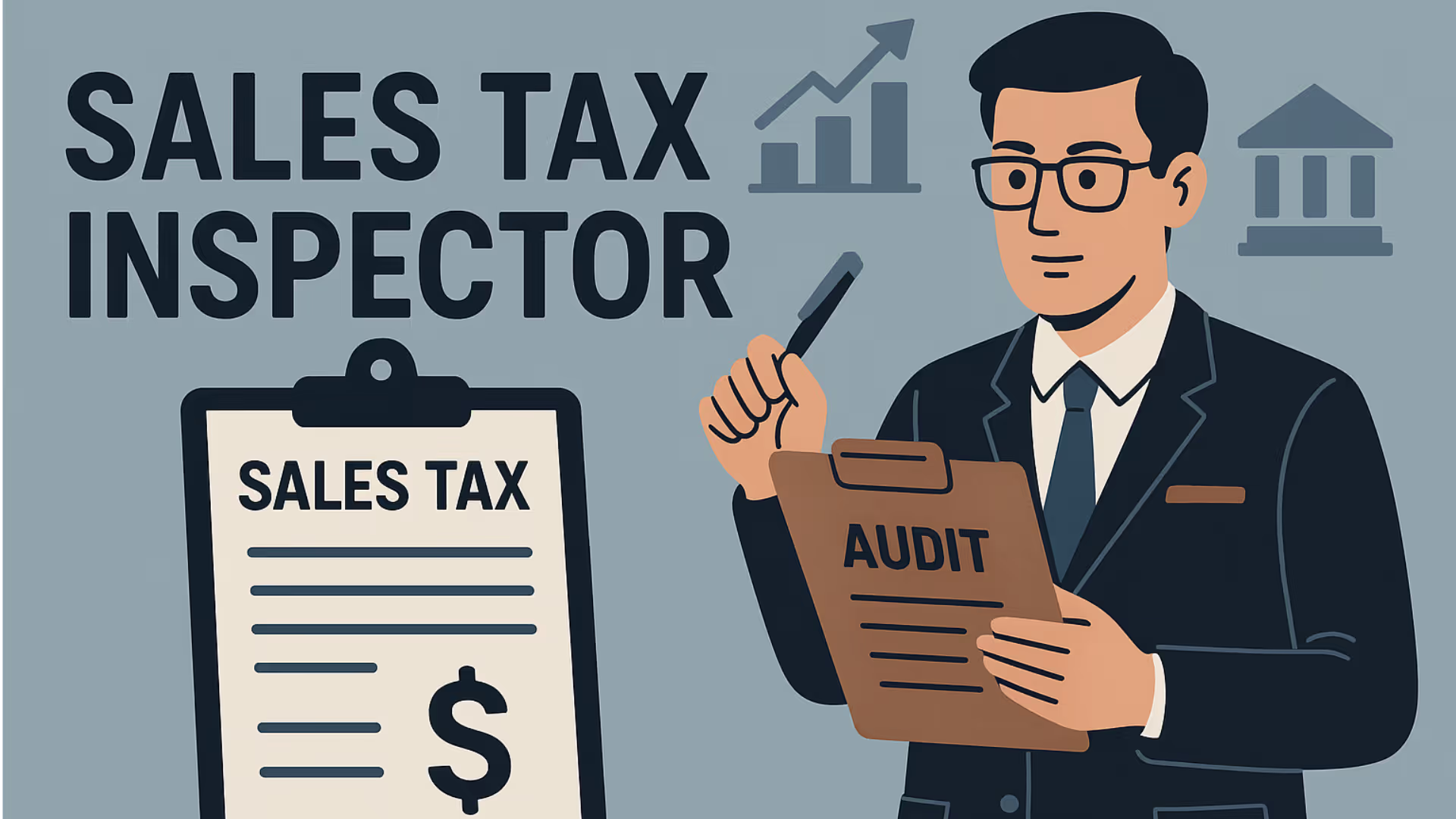

Ever wondered who makes sure that businesses are paying their fair share of taxes? That’s what sales tax inspectors do. They work behind the scenes to ensure that sales taxes are collected properly and honestly. Whether it’s checking records, doing audits or keeping tabs on suspicious activities, they are responsible for keeping things fair.
A typical day in the life of a sales tax inspector might start with planning field visits to local businesses or reviewing submitted tax documents. They spend time examining invoices, comparing reported sales with actual figures, and sometimes even interviewing business owners to clarify details.They play a significant role in ensuring that the tax system functions smoothly.
Let’s understand the role of sales tax inspectors in detail, shall we?
Who is a sales tax inspector?
{{callout-3}}
What are the responsibilities of a sales tax inspector?
Monitoring tax collection
Sales tax inspectors ensure that the taxes collected align with the products or services sold, and that no underreporting or overcharging takes place.
Inspection and auditing
They conduct audits and inspections of business records, including examining invoices, sales registers, tax payment receipts and other financial documents to verify the accuracy of tax submissions.
Verification of tax returns
Inspectors cross-check the tax returns filed by businesses against their actual records to find inconsistencies such as unusually low sales figures or unexplained deductions.
Investigation of tax evasion
They’re trained to investigate potential cases of tax evasion which can include unreported income, false invoicing, or manipulation of accounts.
Enforcement of tax laws
They take action when businesses violate tax regulations which involve issuing penalties, seizing documents, or initiating legal proceedings in serious cases of non-compliance.
Guidance and education
They advise business owners on how to correctly collect, report, and remit sales taxes, helping prevent issues before they arise.
Reporting and documentation
They maintain detailed records of their findings, actions taken, and any follow-ups required. These reports are essential for accountability and may be used in legal proceedings or policy planning.
GST Act(s) and Rule(s) – Bare Law
What skills do sales tax inspectors need?
Accounting and financial expertise
Being able to understand accounting principles, ledgers and financial statements is essential. You also need to be able to interpret and analyse financial records and tax returns effectively.
How to improve this skill?
- Enroll in courses offered by the Institute of Chartered Accountants of India (ICAI) or other recognized institutions for a strong foundation in Indian accounting standards.
- Study GST-specific accounting practices and maintain updates on circulars and notifications from the CBIC (Central Board of Indirect Taxes and Customs).
Attention to detail
You have to be precise while checking financial data, forms and reports and during documentation.
How to improve this skill?
- Create and use detailed checklists tailored for GST audits and inspections. Include verification of GSTIN, HSN/SAC codes, tax rates, and e-way bills.
- Practice cross-referencing data between different documents (e.g., sales invoices, GSTR-1, GSTR-3B) to identify discrepancies.
Problem solving skills
Being able to judge the validity of financial claims and decide corrective measures is also an important skill.
How to improve this skill?
- Analyze past tax disputes available on government websites or legal databases to understand the reasoning and resolutions applied.
- Develop decision flowcharts for common tax discrepancies which will help in structuring analysis during inspections.
Communication skills
You should be able to communicate complex tax laws to business owners in simple words.
How to improve this skill?
- Practice explaining complex GST provisions to individuals with varying levels of understanding. Create simple guides or FAQs in regional languages if applicable.
- Focus on drafting clear and concise notices and reports that adhere to legal and administrative standards.
- Organize mock interview sessions with senior inspectors to practice explaining audit findings and responding to taxpayer queries.
Technical skills
You should be able to use accounting software, tax management systems, and digital audit tools efficiently.
How to improve this skill?
- Obtain certifications in government-used software like the GST portal, e-way bill system, and related tools.
- Practice data analysis using Excel specifically for tax-related datasets. Learn to use pivot tables, VLOOKUP, and other functions that are helpful for audit checks.
Legal knowledge
You must possess in-depth knowledge of local, state and national tax laws. It’s also essential to be aware of the legal process related to tax disputes and enforcement. Also, ensure that you are familiar with GST or VAT systems.
How to improve this skill?
- Regularly review circulars, notifications, and orders issued by the CBIC and state tax departments. Subscribe to official government newsletters and alerts.
- Attend workshops and training sessions conducted by the National Academy of Customs, Indirect Taxes and Narcotics (NACIN).
{{callout-2}}
What KPIs measure success of sales tax inspectors?
Number of audits/inspections conducted
This measures the number of field audits or desk reviews completed per month or quarter. A higher number of completed audits reflects an inspector's efficiency in covering their assigned territory or businesses. It helps tax departments track how active and engaged inspectors are in their roles.
Tax revenue recovered
This measures the total amount of additional tax, penalties, and interest recovered through audits or investigations. It’s a direct indicator of how well or badly inspectors are doing their job by identifying underreporting and enforcing compliance.
Accuracy of audit reports
This measures the number of audit reports which have errors or require rework and can be reviewed by supervisors or quality control teams. High-quality, error-free reports ensure that findings are legally sound and stand up to scrutiny in tribunals or courts.
Compliance rate of audited businesses
This measures the percentage of audited businesses that comply fully with tax rules in follow-up inspections. A higher compliance rate suggests that the inspector not only enforces rules but also educates and influences future behavior.
Rate of case resolution
This measures the percentage of cases closed within a specific time period, say 30 or 60 days. The faster and more thoroughly an inspector can conclude a case, the more effective they are. Delays in resolution can lead to backlogs and reduced enforcement impact.
Average time per audit
This refers to the average number of hours or days spent per audit or case. While thoroughness is essential, spending too much time on a single audit can reduce overall productivity.
Reduction in repeat offenders
This measures the year over year decrease in businesses that are repeatedly found to be non-compliant. A reduction in repeat offenders signals effective corrective action and deterrence.
What tools do sales tax inspectors use?
Accounting software
Inspectors often review businesses' financial records through widely used accounting platforms like QuickBooks, Tally, or SAP. These tools provide detailed transaction histories, sales ledgers, and tax summaries. Understanding how businesses use these systems helps inspectors verify tax filings and identify discrepancies.
Tax filling and compliance portals
Government portals like the GSTN (Goods and Services Tax Network) in India or IRS e-File in the U.S. are critical tools for inspectors. These platforms offer real-time access to filed returns, payment records, and compliance status, allowing inspectors to cross-check information reported by businesses.
Data analysis tools
To detect patterns, anomalies, and potential fraud, inspectors use data analysis software such as Excel, Power BI, or more advanced platforms like SAS and Tableau. These tools help in visualizing trends, flagging inconsistencies in tax data, and prioritizing high-risk audits.
Document management systems
Inspectors deal with a large volume of digital and physical documents. A DMS allows them to store, retrieve, and manage records efficiently. It also ensures that all files are securely archived and easy to access during audits and investigations.
Audit and workflow management tools
Tools like CaseWare, TeamMate, and AuditBoard help streamline the audit process. These platforms support case management, checklists, task assignments, and tracking audit progress. They ensure consistency, compliance, and proper documentation throughout an inspection.
Mobile inspection apps and devices
Modern tax inspectors often conduct on-site inspections using tablets or smartphones loaded with custom apps. These apps enable them to collect data, take photographs, verify inventories, and even sync reports directly to central systems- all in real time.
Legal and regulatory databases
Tax laws are constantly evolving. Inspectors use legal research tools such as Manupatra, Westlaw, or government databases to stay informed about the latest tax regulations, court rulings, and policy updates. This helps ensure their findings are legally sound.
What challenges do sales tax inspectors face?
Non-compliance and evasion
Many businesses, especially small or unregistered ones, often try to evade taxes by underreporting sales or maintaining inaccurate records.
Solution: Regular surprise inspections combined with modern tools like e-invoicing systems and POS data tracking can help catch discrepancies more effectively.
Lack of digital literacy
With increasing digitization in tax administration, inspectors are expected to work with complex software and online databases. They may struggle if they lack the required technical skills.
Solution: Regularly engaging in upskilling programs, hands-on workshops, and utilising user-friendly digital platforms can help inspectors perform their duties efficiently.
Legal and regulatory complexity
Misinterpretation of tax laws can lead to flawed inspections or legal backlash.
Solution: Clear guidelines, legal support teams, and real-time access to updated regulations through digital portals can help inspectors make informed decisions.
Pressure and intimidation
Inspectors may sometimes face undue pressure or threats from influential or non-compliant businesses.
Solution: Inspectors should strictly follow due procedures and maintain clear documentation of inspections, communication, and decisions to ensure transparency. They should avoid solo visits in high-risk cases. Also, they should report threats to higher authorities immediately.
Resource constraints
Many departments operate with limited manpower and outdated infrastructure which affects the speed and accuracy of inspections.
Solution: Investing in automation tools, mobile inspection apps, and better logistics support can significantly improve operational efficiency.
{{callout-1}}
A day in the life of a sales tax inspector
While the role of a sales tax Inspector might sound technical on paper, their day-to-day routine comprises fieldwork, desk audits, problem-solving, and public service. Here's what a typical day might look like for an inspector working under India’s GST regime:
Morning routines
Reviewing the day's audit list
Their day usually starts at the office with a hot cup of chai(or coffee) and a stack of files. The inspector goes through their daily schedule, which might include desk audits, field visits, or follow-up meetings. Using data from the GST portal, they shortlist businesses for scrutiny perhaps due to irregular filing, high input tax credit claims, or mismatched returns.
Visiting a local business for inspection
If a field audit is planned, the inspector heads out to visit the premises of a registered business. Equipped with prior return data and past filing history, they verify documents such as invoices, purchase orders, and e-way bills. Sometimes, they cross-check stock registers or question staff to verify compliance.
For example, they might verify whether a garment retailer is charging and remitting the correct GST rate on clothing items.
Afternoon tasks
Filing reports and tasks
Back at the office, the inspector prepares preliminary findings based on the visit. If any discrepancies are found like mismatched tax invoices or underreported sales- they document these in an inspection report. These findings may later be used to issue notices under Sections 61 or 73 of the CGST Act.
Attending a taxpayer grievance meeting
Sales tax inspectors often meet with business owners or accountants who need clarification or assistance. Whether it’s helping someone file their first GSTR-1 or explaining the correct use of HSN codes, the inspector’s job also includes educating and guiding taxpayers toward compliance.
Evening schedule
Coordinating with other departments
GST enforcement often requires collaboration. Inspectors may hold briefings with senior officers or anti-evasion teams, especially if fraud or large-scale evasion is suspected. They may also refer cases to the intelligence or legal department for further action.
Updating logs and submitting daily summary
Before wrapping up, the inspector updates internal records, submits findings through the GSTN system, and logs pending follow-ups. Documentation is crucial, as these records support any future audits, assessments, or legal actions.
Career growth opportunities
Entry-Level Position: Sales Tax Inspector.
Mid-Level Positions: Assistant Commissioner of Tax, Deputy Commissioner.
Senior-Level Positions: Commissioner of Tax, Director of Revenue.
Sales tax inspector salary
According to Glassdoor, the estimated salary for a tax inspector is ₹8,02,376 per year in India. However, salaries can vary significantly based on experience, location, government level (state vs. central), and other factors. Source
Heading text
Nunc sed faucibus bibendum feugiat sed interdum. Ipsum egestas condimentum mi massa. In tincidunt pharetra consectetur sed duis facilisis metus. Etiam egestas in nec sed et. Quis lobortis at sit dictum eget nibh tortor commodo cursus.
Odio felis sagittis, morbi feugiat tortor vitae feugiat fusce aliquet. Nam elementum urna nisi aliquet erat dolor enim. Ornare id morbi eget ipsum. Aliquam senectus neque ut id eget consectetur dictum. Donec posuere pharetra odio consequat scelerisque et, nunc tortor.
Nulla adipiscing erat a erat. Condimentum lorem posuere gravida enim posuere cursus diam.
.svg)






